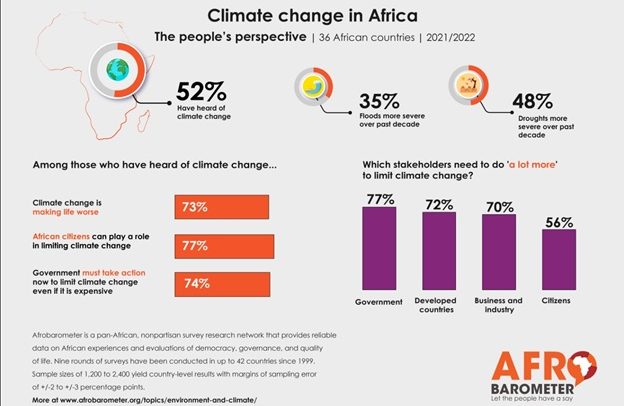Increasing Drought, Low Climate Awareness Characterize Africa’s Climate Reality
Afrobarometer has led an Action Hub event at the Africa Climate Week (ACW) highlighting Africans’ views on climate change, including perceptions of worsening drought and an urgent need for climate action.
AWC takes place two months ahead of the United Nations Climate Change Conference of the Parties, COP28 in Dubai, United Arab Emirates, setting the stage for meaningful conversations around climate action.
At the TEDx-style event, representatives from the Institute for Development Studies at the University of Nairobi, Afrobarometer’s core partner for East Africa, shared findings from Round 9 surveys in 36 African countries in 2021-2022, shedding light on Africans’ perceptions of climate change.
Project Manager, Sam Balongo, revealed that citizens demand urgent government action on climate change: Majorities in all 36 countries want their government to take action now to limit climate change, even if it is costly, causes job losses, or takes a toll on the economy.
In 14 countries, 80% or more of citizens who are aware of climate change share this view.
The findings also show that only about half (52%) of citizens across 36 countries have heard of climate change.
Awareness is as high as 80% in Seychelles, 74% in Malawi, 73% in Mauritius, and 70% in Gabon, but as low as 22% in Tunisia and 29% in Botswana.
Fielding questions from the audience on climate-change awareness Balongo said, “The fact that only half of Africans are aware of this very important issue underscores the urgent need for enhanced education and decisive climate action.”
Among citizens who are aware of climate change, most say it is making their lives worse. This perception is especially widespread in Madagascar (91%), Lesotho (88%), Mauritius (86%), Malawi (86%), and Benin (85%).
On the worsening impact of climate change on citizens’ lives, Afrobarometer Assistant Project Manager Anne Okello noted that “about half of Africans say droughts have become more severe over the past 10 years, while one-third say the same about floods.”


